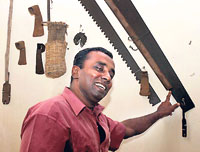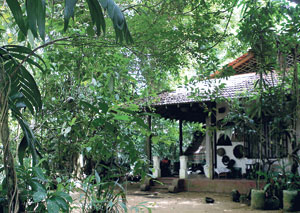The house is a museum and the garden a rainforest.
Just 5.5 km from Horana town, by the side of a public road in Horaketiya, Kudaoduwa, this house and garden are testimony to one man’s passion for all things natural and a yearning to preserve for posterity the culture of daily living of our forebears.
For 49-year-old Nandasiri Pattiarachchi, a humble teacher at the Millewa Maha Vidyalaya to fulfil his dream of recreating a rainforest did not require acres and acres of land. With commitment and dedication, this teacher of agriculture has managed with 30 perches his parents gifted him, for both his home and forest.
Starting in 1993 with a few seeds here and a small plant there, all brought from the Wet Zone during his forays into the jungles, Nandasiri has coaxed and nurtured, watered and tendered his garden moulding a rainforest by this busy road, which needs to be seen to be believed-- during his free time rarely taking a day away from his students to whom he has been teaching agriculture for 21 long years.
His home-garden rainforest has as many as 250 species of trees including 150 flowering trees, six species of palms, 20 types of creepers, numerous bushes and shrubs, orchids, ferns such as bird’s nest and lichen.
“Hora pavule 8, Na pavule 3, ehela, milla, ata liyan, hik, beraliya thiyenawa,” says Nandasiri explaining that among the species in his garden are eight Hora trees, three types of Na trees and many more. All three special Na varieties found in the country are also here.
He is very proud of the rare horawel he has grown from two seeds he had brought home. “There are only about 650 of them at Walauwatte-Waturana swamp forest at Bulathsinhala,” he reveals.
Walking around his garden he points to that tree or this shrub, gently touching the leaves and explaining that though he has 20 wel varga (creeper-varieties) he has no pus wel only duul wel. These korasawel are so strong that they are used to tie cattle, he says.
Nandasiri smiles when the Sunday Times asks how it all began. Even as a boy he loved the jungle, he says, and would bring back seeds and plants whenever he was able to. As a youth he joined the Hardy Technical Institute in Ampara to follow a Diploma in Agriculture and later tried his hand at two or three jobs, before finally finding his vocation in teaching.
1987 saw him at his first posting in a remote village off Bibile, fostering his love of the environment. Living in a chummery with a few Forest Department officials, who took the “iskole mahaththaya” on their journeys into forests, it was a natural entry point into conservation for him, while weekends and holidays he also spent in the jungle with a band of like-minded students, experiencing the biggest thalawas (local savannah forests) in Nilgala.The biodiversity lured and overwhelmed him at the same time. He learnt the names of each and every tree or plant that he came across………with the roles reversed and some of his students from the area becoming the teacher.
While he enjoyed the lessons about the valuable timber trees or the tender medicinal plants, he was also saddened by the fact that some varieties were vanishing and vanishing fast.
Resources were being destroyed at will and this prompted him to form a Nature Club at the Bulathsinhala Yata Gampita Kanishta Vidayala.
“There was scant regard for the environment,” he says.
His home being in Horana which has a high humidity, it was the right environment for his very own rainforest. He had grown 86 varieties of orchids in his garden and enjoyed their full glory but is now left with only about 25 varieties. “You need time, money and labour,” he says sadly.
Nandasiri’s rainforest, however, has caused some marital disharmony, with wife Anoma grumbling every time she has to dry a load of newly-washed clothes. The canopy over his garden is such that no sunlight filters through, putting Anoma in a bad mood as she has to walk to a bare land across the road with the wet clothes.
But how this family of father, mother and daughter imbibe the beauty of the rainforest is evident when Nandasiri describes the day the unabated chattering of the demalichchiyas (babblers) alerted them to some unusual happening. When they stepped out they saw amidst the velgolla (canopy), a line of lorises, seven with three young ones. One was wrapped around its mother’s tummy, he says in wonderment, contrasting it with another close view of an injured rat being attacked by an army of kadiyas. Rolled over and over by a ball of kadiyas, he saw to his horror only the poor rat’s bones the next morning.
Having not seen any poisonous snakes in his garden, Nandasiri need not journey south to Sinharaja but step without fear into his garden to enjoy the wondrous glory of a rainforest.
A houseful of curios
 |
| Nandasiri points to some of the curios that adorn a wall |
An inveterate collector, Nandasiri’s house is choc-a-block with stuff from the past- those used by our ancestors in their daily lives and livelihoods. Kitchen utensils, scales and weights when pounds were in vogue, tools of different trades, water-carrying pots, even hats worn by those who labour in the field are scattered around his home.
Kurundu thalana, redi appullana, ra perana, le erana badu thiyenawa, says Nandasiri explaining that these are tools used by those who were in the cinnamon business, the dhobis, toddy tappers and sawers of wood.
On his journeys into villages he has also seen such rare things like the trap known as Luula for such animals as sambhur, wild boar and even wild elephant by those who lived long ago. |



